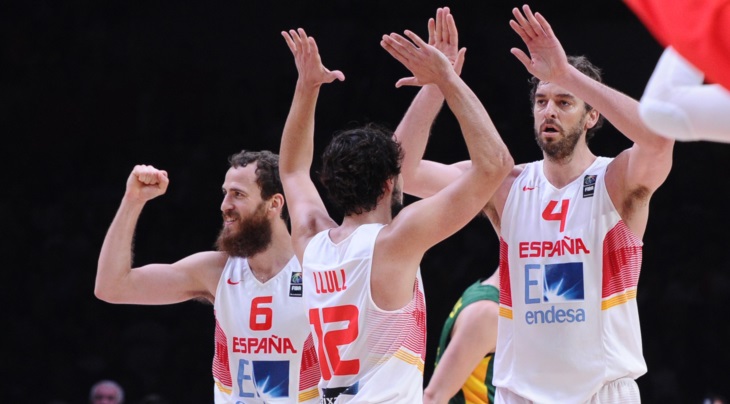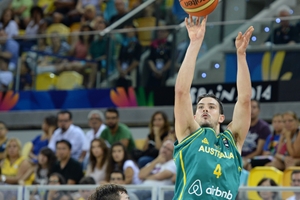
'To the victor goes the spoils' is how it ought to be
VALENCIA (Jeff Taylor's Eurovision) - Spain and Lithuania will play at the Olympics. It's a right that both earned by reaching the Final of last year's EuroBasket.
Lithuania are keeping their remarkable streak alive of playing at every Olympics since 1992, when Jonas Valanciunas was a two-and-a-half-month old bundle of joy. Spain also have a nice streak going. They are going to play at a fourth consecutive Olympics.
Each side proved its mettle by making it through an extremely difficult, 24-team field to play in the EuroBasket 2015 title game.
What if Olympic qualification was not the way, though?
What if the International Olympic Committee (IOC) looked at both Spain and Lithuania and thought, "These are two of the best, most attractive basketball teams in the international game. Why don't we sign them to contracts which ensure their participation at the next three Olympics? We could also identify other attractive teams for our competition."
What if that is how it worked? Fortunately, the IOC does not cherrypick teams for its Olympic competition. All teams have to qualify. It's a simple, straight-forward concept, one that says a team must earn its place.
Now, if the IOC were to sign countries to deals to have the most attractive basketball teams in their tournament, where would that leave the game in Venezuela, for example?
This is the country that showed us what sports is all about last year in Mexico City. They overcame the odds, upset Canada in the Semi-Finals of the FIBA Americas Championship and clinched a spot in the Olympics for the first time since 1992.
Venezuela entered the sporting arena, knowing a top-five finish would get them to a FIBA Olympic Qualifying Tournament. They also knew a spot in the Final in Mexico would get them to the Olympics.
What has Venezuela's success meant? It's taken the sport’s popularity in the country to an all-time high. It has won new fans to the game, made little boys decide they want to one day become basketball stars. It has also demonstrated that a team, if it has players that work hard and dream, can eventually take part, on merit, in a major tournament.
Every international basketball team has the right to at least be like Venezuela. This is a key tenet of the Basketball Champions League, which is going to launch in the 2016-17 campaign. Teams are going to have to earn the right to take part, just as Spain, Lithuania and Venezuela have earned the right to play at the Olympics.
The sporting principle will dictate who takes part. This is a good way forward. Teams in every domestic league around Europe will know that a strong showing in a domestic competition will earn them the right to play in a continental competition.
Isn't this a fair way of determining which teams make up a European league, instead of signing clubs to contracts which allows them to play in a European league no matter how good or how bad their performances have been on the domestic front?
There has been a European basketball dispute between FIBA and Euroleague Commercial Assets (ECA) in recent months. I think from FIBA's standpoint, it is a battle they believe they must win to protect the integrity of domestic leagues and give legitimacy to continental competitions.
As part of the fallout from the dispute, FIBA Europe in April suspended several federations, and that action put the national teams of each at risk of missing out on FIBA EuroBasket 2017. One of those federations was Spain's FEB. There were rumblings in Europe that FIBA might block Spain from playing in the Olympics.
FIBA Europe Board confirms positive response by NFs, will continue to monitor situation https://t.co/aRy8A05hFz pic.twitter.com/SNpmIB0T8K
— FIBA media (@FIBA_media) May 27, 2016
On Friday in Dublin, the FIBA Europe Board announced: "The Board had received and reviewed a report by the Executive Committee of FIBA Europe regarding the remodeling of European Club Competitions. The Board noted that the National Federations impacted had reacted positively to the Board's decision of 20 March 2016 and, as a result, no national federation is currently affected in a negative way by the decision. Consequently, the senior men's national teams are currently expected to take their respective places in the next competitions organised by FIBA Europe."
The fear that Spain might also be prevented from playing at the Olympics clearly existed in the country. After Friday’s announcement, the country’s Secretary of State for Sport, Miguel Cardenal, said to Europa Press: "I want to express my satisfaction over the decision by FIBA to allow our national basketball team to be able to defend its position in Rio de Janeiro this summer and in the EuroBasket next year and to thank everyone that has participated in the efforts in order to help us revert this situation, especially the Spanish Federation and its president."
From my vantage point, Spain were never in danger of losing their place at the Olympics. It earned the right to participate with its performances on the court. Sporting merit is a concept that means something to FIBA.
Jeff Taylor
FIBA
FIBA's columnists write on a wide range of topics relating to basketball that are of interest to them. The opinions they express are their own and in no way reflect those of FIBA.
FIBA takes no responsibility and gives no guarantees, warranties or representations, implied or otherwise, for the content or accuracy of the content and opinion expressed in the above article.

















